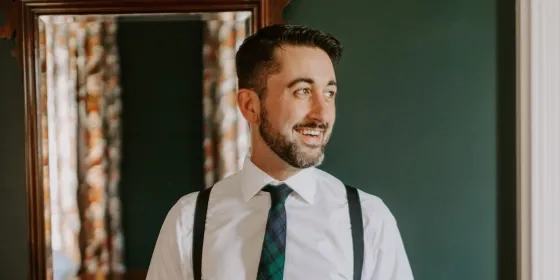Erik Malmquist ‘12, Executive Director of Elgin Symphony
Alum returns to helm his hometown orchestra
Erik Malmquist ‘12 has worn many hats in the classical music world. His multiple careers in music include vocal education and working as a violinist, producer, manager, and operations director. These various experiences have given the SFCM alum the tools he needs for his latest role: Executive Director of the Elgin Symphony Orchestra (ESO) in Illinois—an ensemble that shaped his love of music long before he went to music school.
Musical Beginnings
“This really is the place that I came of age,” says Malmquist when describing his upbringing at the Elgin Symphony.
He saw his first ESO concert at the age of three. Throughout his childhood, he would see dozens of performances including by guest artists like Itzhak Perlman, Yo-Yo Ma, Kathleen Battle, and James Galway.
His father Joseph has been a violinist in the orchestra for over 40 years. While Malmquist never studied with his father, he learned from many of Joseph’s colleagues in the orchestra some of whom were also members of the Chicago Symphony.
“I discovered that it doesn’t take having a violin under my chin to create something impactful.”
Malmquist shifted his focus to vocal education for his undergraduate studies thinking he would become a choral conductor and teacher. While he loved singing, he also felt passionate about violin and eventually made the choice to apply to graduate violin programs. That’s when he found and eventually chose to study at SFCM.
Time at SFCM
San Francisco felt right to Malmquist.
“It was such an incredible place and had this intangible vibe,” he recalls.
Along with a curiosity about the city and all it has to offer, Malmquist chose SFCM for its faculty. He studied with renowned violinist and mentor Ian Swensen, who he calls “a more intense Yoda,” and also worked with other members of the strings department.
Malmquist was greatly impacted by SFCM’s collaborative spirit. This was particularly evident in his chamber music seminar.
Students would perform for the chamber program faculty and received feedback from and worked with all the faculty—not solely their studio teacher. Rather than a rivalry, faculty members had what Malmquist calls a “playful” relationship with one another and were more than happy to discuss interpretations of theirs and students’ work in a collegial manner.
“It was a great way to have a strong professional opinion and express it in a way that is anything but confrontational,” says Malmquist. “I got to see that [achieving] excellence in string playing doesn't mean you can't listen to anybody else's opinion.”
Malmquist never forgot this collaborative way of working. He carried it with him to New York after graduation.
Road to Artistic Planning
“I was somebody that could never really commit to what I wanted to do,” jokes Malmquist. “I love singing. I love playing. And, I love the organizational side of things.”
Things came into focus after his time at SFCM when he moved back east.
Living in New York City, Malmquist worked as a freelance violinist and played in the orchestra for Manhattan Concert Productions, a company that manages tours for high school and college choirs to sing at Carnegie Hall and Lincoln Center.
He also worked in their office and began honing his production skills—something he was enjoying more by the day. One instance of helping to craft a new season left a particular impact.
“Part of my responsibility was hiring soloists for a Schubert Mass and Mozart Requiem, and I would just bury myself in this work, combing the internet for singers who would be the right fit,” recalls Malmquist.
He continues, “It was a really eye opening moment for me, because I discovered that it doesn’t take having a violin under my chin to create something impactful. I know that quartet exists because we sat there and thought carefully about what those voices would sound like together.”
Passionate about the collaboration and producing side of the classical music business, Malmquist began to see a future for himself beyond performance.
He left Manhattan Concert Productions and forged a six-year career as an Artist Manager and later Director of Operations at Zemsky Green at Zemsky Green Artists Management, working with some of today’s most renowned opera stars. Simultaneously, he served as General Manager of Bach Vespers at Holy Trinity on New York’s Upper West Side.
After nearly a decade in the city, Malmquist knew it was time for a change—one that would take his career in music back where it all started.
An Elgin Homecoming
Malmquist took a job as the ESO’s Director of Artistic Planning and Operations. In May, he became the orchestra’s new Executive Director.
“As an orchestra, the Elgin has had different generations and [fostered community] in different ways,” says Malmquist. “I think our generation is building off of that and pushing forward. Everything we do here [at Elgin] has to at least feed one of three important pillars: musical excellence, social advocacy, and economic development.”
This position offers him the opportunity to expand the symphony’s investment and presence in Elgin and its surrounding areas, and find ways to speak to communities that are not traditionally contacted by classical audiences.
Malmquist’s executive director role is an exciting place to be for the young arts administrator and one where he taps into all the skills he learned at SFCM and throughout his music career. He has finally found his calling.
See how other SFCM students and alumni are making an impact.
